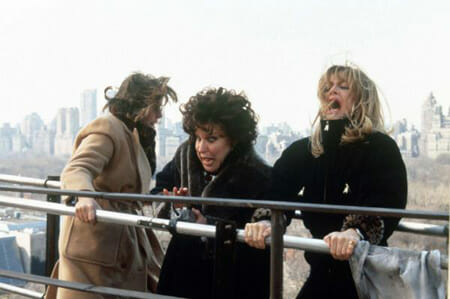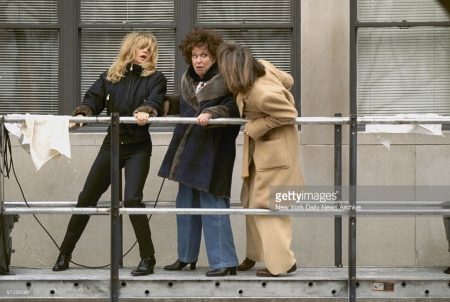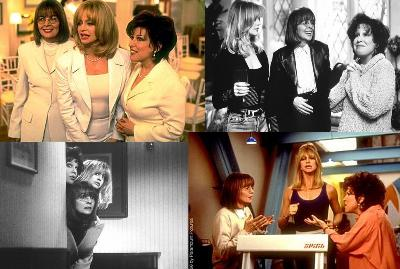Time
Monday, Oct. 07, 1996
HOLLYWOOD’S BEST REVENGE
By KIM MASTERS
Ask the founding members of THE FIRST WIVES CLUB: What made masses of women ages 25 and older defy long-established patterns by rushing to buy opening-weekend tickets like a crazed herd of young male action-movie fans stampeding to the 16th Die Hard sequel?
“To tell you the truth, I just don’t have a clue,” says Bette Midler. “But I’m so excited I couldn’t care less.” “Do you believe it?” asks Diane Keaton, “I just thought it was going to be a nice comedy,” she says. Only Goldie Hawn asserts that while she didn’t necessarily expect such success, “I totally get it.” The movie, she feels, is about “that primordial thing that men feel and women innately know.” And that is? The consequences of the male impulse “to just walk around and impregnate and spread their seed.”
The film has woman-to-woman origins, though it ended up in the guiding hands of men. Paramount chairman Sherry Lansing bought the rights to the Olivia Goldsmith novel when it was still just an idea and Lansing was still a producer. After she took over the studio, she handed the project to the prolific Scott Rudin (who produced Clueless and The Firm), who in turn hired Steel Magnolias screenwriter Robert Harling. Admittedly not a woman, Harling says he did bring some personal insight to the first-wife mind-set. “They tell you to write what you know,” he says. “I’m a man, and I know what a jerk I am.”
Director Hugh Wilson (Guarding Tess) took the helm and thought the script was “too fluffy.” He proposed big changes (in his version, for example, Keaton’s child is retarded). “I wanted to make it more realistic and, I thought, funnier,” he recalls. “I was saying, ‘It’s too easy; they all have money. What does a woman do who doesn’t have money? And why the hell do they just have two children [among them]?’ I thought it should be more in line with the average person.” Now he says in relief, “Thank God I got talked out of it.”
The production hit a rough patch when Hawn tried to drop out shortly before shooting started. Paramount’s Lansing played hardball, threatening to sue. “I’ll take your house,” an insider remembers her threatening. Hawn stayed in but asked for changes to make the women less shrewish. “I stuck with that bone and didn’t let it go,” she says. Addams Family Values screenwriter Paul Rudnick polished the script. And Midler, demanding more comedy, improvised some of her sharpest lines, including her comment to her husband’s lithe mistress: “My, my. The bulimia certainly has paid off.”
The onscreen sisterhood worked fine, but Wilson didn’t forget he was dealing with three big stars. “I was Solomon-like with this thing,” he says. “If one got a close-up, everyone got a close-up. I’d count lines and say, ‘This scene is really good for her, so the next one should be good for someone else.'”
Though the life of none of the actresses strictly parallels her character’s, Midler (still on her first marriage) says she relates to the first wife’s plight. “I always read the papers, and I keep up with all the great divorces, and I am as chagrined and appalled as the next person,” she declares. The never married Keaton has been linked in the past with Warren Beatty and Woody Allen, both of whom have gone through their share of women. But Keaton reports that her romances were “nothing like in this movie.” Hawn, longtime roommate of Kurt Russell (she has paid alimony to an ex-husband), says all women–even happily married ones–respond to the movie because they know men have roving eyes.
Of the trio, Hawn’s character clings most tenaciously to youth, but the actress herself says she wasn’t worried about showing her years onscreen. “What are you trying to protect?” she asks. “A career? A perception? I mean, we’ve been around the block a hundred times. What the hell?” Keaton agrees: “I can’t play the younger babe. I was just happy to have the part, and I’m not kidding.”
Midler says she wanted Hawn’s part because Hawn got to wear the best clothes, while her character was more of a frump. “I was the workhorse of the trio,” she laments. “I didn’t have any glamour at all.” But Midler says she doesn’t mind playing her age; the hard part is getting a chance to do it. “It’s been pretty dry,” she says; after all, Hollywood has not in recent history found the issues of middle-aged women to be particularly absorbing. But, Midler adds, “the phone rings for a while after a big hit like this.” Hawn too would be happy if offered more well-written, age-appropriate roles. “But I love that we’ve been able to put out a movie where you drive down the street and women yell out of their cars, ‘Way to go!'” she says. “That’s a good feeling.”


![Reblog this post [with Zemanta]](http://img.zemanta.com/reblog_e.png?x-id=160dfbc1-af8c-4222-be6e-62a57c9fe9bb)




